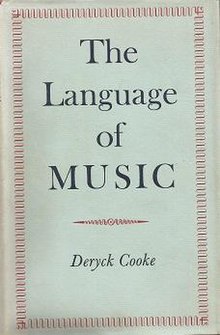| Revision as of 01:18, 10 April 2019 editFreeknowledgecreator (talk | contribs)Extended confirmed users179,107 edits →References: no longer needed as columns are now done automatically← Previous edit | Latest revision as of 23:21, 29 July 2023 edit undoCitation bot (talk | contribs)Bots5,409,770 edits Misc citation tidying. | Use this bot. Report bugs. | #UCB_CommandLine | ||
| (14 intermediate revisions by 3 users not shown) | |||
| Line 1: | Line 1: | ||
| {{short description|1960 book by Deryck Cooke}} | |||
| {{Infobox book | <!-- See Misplaced Pages:WikiProject_Books --> | {{Infobox book | <!-- See Misplaced Pages:WikiProject_Books --> | ||
| | name = The Language of Music | | name = The Language of Music | ||
| Line 13: | Line 14: | ||
| }} | }} | ||
| {{Distinguish|The Language of Music (theory book)}} | {{Distinguish|The Language of Music (theory book)}} | ||
| '''''The Language of Music''''' is a 1959 book about music by the critic and musician ]. | '''''The Language of Music''''' is a 1959 book about ] by the critic and musician ]. | ||
| ==Reception== | ==Reception== | ||
| ===Mainstream media=== | |||
| Robert M. Wallace reviewed ''The Language of Music'' in '']''.{{sfn|Wallace|1962|pages=480–482}} | Robert M. Wallace reviewed ''The Language of Music'' in '']''.{{sfn|Wallace|1962|pages=480–482}} | ||
| ⚫ | ''The Language of Music'' is an often cited representative of the expressionist theory of art.{{sfn|Sharpe|1995|page=599}} No systematic experimental study of Cooke's theory has emerged relating it to ], but one pilot study showed that for 22 non-musician students, his characterizations of musical phrases were not experienced.{{sfn|Spender|2004|page=631}} The philosopher ] writes that ''The Language of Music'' is, "A valuable start down what is sure to be a long hard road to understanding music and the human mind."{{sfn|Hofstadter|1980|page=747}} | ||
| ===Evaluations in books=== | |||
| ⚫ | ''The Language of Music'' is an often cited representative of the expressionist theory of art.{{sfn|Sharpe|1995|page=599}} No systematic experimental study of Cooke's theory has emerged relating it to ], but one pilot study showed that for 22 non-musician students, his characterizations of musical phrases were not experienced.{{sfn|Spender|2004|page=631}} The philosopher ] writes |
||
| ==References== | ==References== | ||
| Line 28: | Line 27: | ||
| ;Books | ;Books | ||
| {{refbegin}} | {{refbegin}} | ||
| * {{cite book |last1=Hofstadter|first1=Douglas |title=Gödel, Escher, Bach: An Eternal Golden Braid |publisher=] |location=London |year=1980 |isbn=0-14-005579-7 |
* {{cite book |last1=Hofstadter|first1=Douglas |title=Gödel, Escher, Bach: An Eternal Golden Braid |publisher=] |location=London |year=1980 |isbn=0-14-005579-7 }} | ||
| * {{cite book |last1=Sharpe|first1=Robert | |
* {{cite book |last1=Sharpe|first1=Robert |chapter=Music |editor-last1=Honderich|editor-first1=Ted |title=The Oxford Companion to Philosophy |publisher=] |location=Oxford |year=1995 |isbn=0-19-866132-0 |url-access=registration |url=https://archive.org/details/oxfordcompaniont00hond}} | ||
| * {{cite book |last1=Spender|first1=Natasha | |
* {{cite book |last1=Spender|first1=Natasha |chapter=Music, psychology of |editor-last1=Gregory|editor-first1=Richard L. |title=The Oxford Companion to the Mind, Second Edition |publisher=] |location=Oxford |year=2004 |isbn=0-19-866224-6 }} | ||
| {{refend}} | {{refend}} | ||
| ;Journals | ;Journals | ||
| {{refbegin}} | {{refbegin}} | ||
| * {{cite journal |title=Second Impressions |last1=Wallace|first1=Robert M. |journal=] |volume=194 |issue=21 |year=1962 |
* {{cite journal |title=Second Impressions |last1=Wallace|first1=Robert M. |journal=] |volume=194 |issue=21 |year=1962 }} {{subscription required|via='s Academic Search Complete}} | ||
| {{refend}} | {{refend}} | ||
| {{DEFAULTSORT:Language of Music}} | {{DEFAULTSORT:Language of Music}} | ||
| ] | ] | ||
| ] | |||
| ] | ] | ||
| ] | ] | ||
Latest revision as of 23:21, 29 July 2023
1960 book by Deryck Cooke Cover of the 1960 Oxford University Press edition Cover of the 1960 Oxford University Press edition | |
| Author | Deryck Cooke |
|---|---|
| Language | English |
| Subject | Music |
| Published | 1959 |
| Publication place | United Kingdom |
| Media type | Print (Hardcover and Paperback) |
| Pages | 304 (1990 Clarendon Press edition) |
| ISBN | 978-0198161806 |
The Language of Music is a 1959 book about music by the critic and musician Deryck Cooke.
Reception
Robert M. Wallace reviewed The Language of Music in The Nation.
The Language of Music is an often cited representative of the expressionist theory of art. No systematic experimental study of Cooke's theory has emerged relating it to musical education, but one pilot study showed that for 22 non-musician students, his characterizations of musical phrases were not experienced. The philosopher Douglas Hofstadter writes that The Language of Music is, "A valuable start down what is sure to be a long hard road to understanding music and the human mind."
References
- Wallace 1962, pp. 480–482.
- Sharpe 1995, p. 599.
- Spender 2004, p. 631.
- Hofstadter 1980, p. 747.
Bibliography
- Books
- Hofstadter, Douglas (1980). Gödel, Escher, Bach: An Eternal Golden Braid. London: Penguin Books. ISBN 0-14-005579-7.
- Sharpe, Robert (1995). "Music". In Honderich, Ted (ed.). The Oxford Companion to Philosophy. Oxford: Oxford University Press. ISBN 0-19-866132-0.
- Spender, Natasha (2004). "Music, psychology of". In Gregory, Richard L. (ed.). The Oxford Companion to the Mind, Second Edition. Oxford: Oxford University Press. ISBN 0-19-866224-6.
- Journals
- Wallace, Robert M. (1962). "Second Impressions". The Nation. 194 (21). – via EBSCO's Academic Search Complete (subscription required)